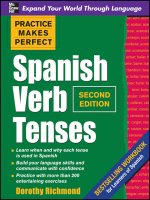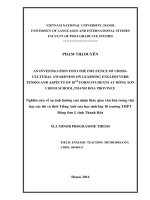Verb tenses and forms
Bạn đang xem bản rút gọn của tài liệu. Xem và tải ngay bản đầy đủ của tài liệu tại đây (526.66 KB, 3 trang )
Verb Tenses and Forms
The basic tenses of verbs are quite simple: past, present, and future. However, each tense
can take one of four forms: simple, progressive, perfect, and perfect progressive. Tense
determines time, and the form determines the relationship the verb has to contextual time.
In other words, verbs can take one of twelve forms. See the chart and examples below and
note the verbs required to determine form. Note that the auxiliary verb for most forms is
that which determines the tense of the whole verb (is, was, will be; has, had, will have).
SIMPLE TENSE
Simple present (action or situation exists now):
I dance.
He dances.
They dance.
Present progressive (action is in progress):
I am dancing.
He is dancing.
We are dancing.
Present perfect (action begins in the past and leads up to and includes the present):
I have danced.
She has danced.
You have danced.
Present perfect progressive (action begins in the past, continues in the present, and may
continue into the future):
I have been dancing.
He has been dancing.
They have been dancing.
PAST TENSE
Simple past (actions or situations are complete and completely in the past):
They danced.
We danced.
She danced.
Past progressive (actions in the past occurred over a period of time):
She was dancing.
They were dancing.
I was dancing.
Past perfect (an action that has been completed before another action or situation):
She had danced.
We had danced.
You had danced.
Past perfect progressive (an ongoing action in the past has ended):
She had been dancing.
We had been dancing.
They had been dancing.
FUTURE TENSE
Simple future (actions will occur in the future):
I will dance.
She will dance.
You will dance.
Future progressive (future actions will continue for some time).
I will be dancing.
She will be dancing.
They will be dancing.
Future perfect (actions will be completed by or before a specific future time):
I will have danced.
She will have danced.
They will have danced.
Future perfect progressive (actions are ongoing up to a specific future time):
I will have been dancing.
You will have been dancing.
He will have been dancing.
Exercise
Indicate the tense of the verbs in the following sentences by clicking on the appropriate
bubble. If your response shows as "Incorrect" in the status bar, you can click on the other
answers to find the correct one (which will give you "Correct" in the status bar).
You need a Java enabled browser like Netscape Navigator 3.0 or Internet Explorer 3.0









